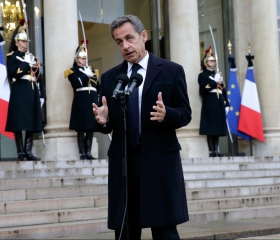An interesting event in Russian–French relations took place in July 2015 when a group of delegates from the French National Assembly went against the official foreign policy line in Paris and visited Crimea. This was immediately followed by an announcement from another European political party, the Italian Movimento Cinque Stelle (Five Star Movement), that it too sought to send an envoy to Russia. Is it fair to assume that the Kremlin has acquired some political allies in Europe? Will the tone of Russian–French relations change?
An interesting event in Russian–French relations took place in July 2015 when a group of delegates from the French National Assembly went against the official foreign policy line in Paris and visited Crimea. This was immediately followed by an announcement from another European political party, the Italian Movimento Cinque Stelle (Five Star Movement), that it too sought to send an envoy to Russia. Is it fair to assume that the Kremlin has acquired some political allies in Europe? Will the tone of Russian–French relations change?
The Argument “For”: Likeminded People Have Found Each Other
It is important to note that the majority of delegates that visited Crimea were Republicans, a party that has since December 2014 been headed by former President Nicolas Sarkozy, who is making his return to politics. Many experts rate his chances of winning the upcoming 2017 presidential elections rather highly, although it remains unclear whether the centre-right party will in fact make him their candidate.
The rapprochement of the Russian elite and Nicolas Sarkozy is not without grounding. The media, for example, was quick to reprint the former French leader’s comments on the events in Crimea as a “drama” in relations between Russia and Europe, stressing that the two sides can find common ground without getting the United States involved. This attitude was obviously to the liking of the Russian leadership, which often call upon the need to act independently in international relations.
The history of relations between Russia and the centre-right camp in France is a plus. Its founding father, General Charles de Gaulle, was always willing to engage in dialogue with the Soviet Union over and above confrontational thinking: suffice it to recall the visit of the First President of the Fifth Republic to the USSR in 1966 and the resulting agreement on cooperation. Although today’s Republicans have little in common with their Gaullist forefathers, their heritage is undeniable. A number of centre-rightists still speak of an independent France in international affairs, beyond the control of any structure, focusing on sovereignty and national interests.
A rapprochement has thus taken place between Russia and one of the biggest political parties in Europe, and Nicolas Sarkozy personally. Close contact with influential political leaders in France will help legitimize Russia’s position on the Crimean issue far quicker than if Moscow continued to rely exclusively on parties that are on the periphery of national politics and often have dubious reputations. In turn, Sarkozy’s possible return to the Élysée Palace in 2017 could mark the beginning of a new stage of development after a long pause. And it is extremely important for Sarkozy to get hold of those voters (in the National Front camp) who did not condemn Russia for returning Crimea to its possession, and even supported the argument that the country was protecting its national interests.
The Argument “Against”: It all Depends on the State of Affairs
All this notwithstanding, there is no shortage of arguments that could reduce the international significance of the French politicians’ visit to Crimea. Russian experts have described the head of the delegation, Thierry Mariani, as a political heavyweight. But this can be seen as somewhat of an exaggeration. In French politics, it is not hard to find other figures that, just like Mariani, have been elected to the National Assembly multiple times, occupied a ministerial post on at least one occasion (and not a key position at that) or headed a party list at regional elections. Mariani’s vice-presidency of the Union for a Popular Movement could be considered a plus if it were not for the fact that he occupied this post in 2013–2014, when the party was not exactly at its peak, ravaged as it was by internal turmoil.
What is more, the visit to Russia was not an isolated incident for the Republicans, which routinely send emissaries to countries that are of interest for whatever reason. For example, shortly before the Crimea trip a number of eminently more recognizable ambassadors, including Nicolas Sarkozy himself, visited Tunisia. Just like the Crimea trip, it was accompanied by colourful statements, with the party’s leader expressing the belief that “only in Tunisia had the Arab Spring been a success”. And in the same vein as the special relationship with Russia, an “historical” foundation for the privileged dialogue with Tunisia was found, in this case the recent terrorist attacks – the Charlie Hebdo murders in Paris in January 2015, and the hotel shooting in Tunisia. It is on the basis of these tragedies that the two countries, according to the Republicans’ logic, could build a more trusting relationship.
On the basis of this example alone (ignoring the fact that Sarkozy had visited Germany, Spain, Israel and other countries earlier), we can conclude that the trip to Russia was nothing out of the ordinary for the centre-rightists. The main opposition party is trying to conduct its own foreign policy, counter-diplomacy. Accordingly, Russia should not overstate the interest of its new friends in Crimean affairs. But it is worth bearing in mind that, right now, this interest fits the general course of Sarkozy’s politics perfectly. In the context of the ever intensifying standoff between the socialists and the centre-right in the run-up to the 2017 elections, any step, including overseas visits, should be treated as renewed attempts on the part of the former president to highlight the ineffectiveness of the course taken by François Hollande.
The Russian side should respond to such events with the utmost caution. Right now, we can with muted optimism state only that Russian diplomacy has, for the time being at least, gained a powerful new ally on the Crimea issue in the form of the French Republicans. But let’s not get overexcited here – Sarkozy is hardly going to profess deeper support for Putin any time soon. Nothing significant will happen in Russian–French relations before 2017, when the two leaders will be able to sit down and conduct an official dialogue at the highest level. The “diplomatic recognition” of Crimea’s return to Russia by Europe is still some way off: one-off visits (by French diplomats, as well as the upcoming visit from the Italian contingent) are not systematic in nature.





